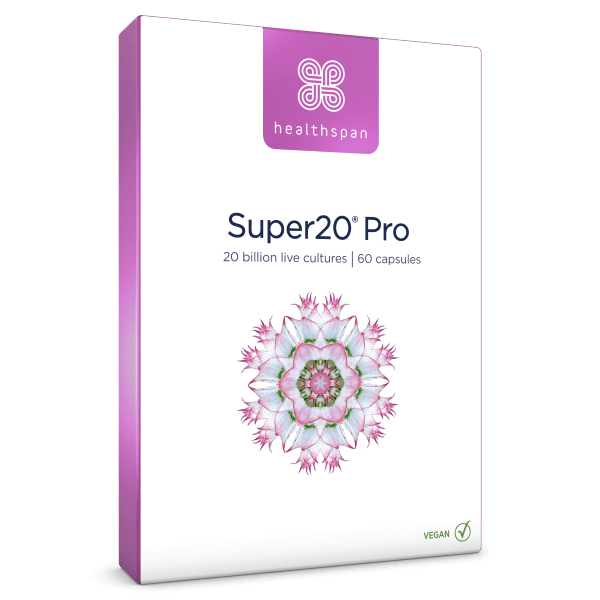Adopting a vegan diet represents a considerable lifestyle change and a fundamental shift in the way you think about food. There’s a lot of information around to help you get started, but one aspect that’s often overlooked is the impact on gut health.
A sudden and relatively extreme change in diet is likely to have an impact on our gut and digestive system. Let’s look at what happens to your gut when you become a vegan, starting with the basics.
Introducing veganism and the gut
Put simply, a vegan diet excludes all products that come from an animal source. It may also be referred to as an exclusively plant-based diet.
Foods that are avoided on a vegan diet include:
- Red Meat
- Poultry
- Fish and seafood
- Eggs
- Dairy products
- Other animal derived products such as honey, gelatin and lactose
There are also sub-types within veganism, such as raw veganism and fruitarianism, that have more exclusions from the diet. However, for the sake accessibility, we'll be focusing on the typical vegan diet for now and its relation to the gut.
The gut is an essential system to consider when it comes to health. It is more than just a place where you digest food; for example the gut is home to around 70-80% of our immune system.1 In addition, it's the gut bacteria and enzymes that help to break down food efficiently into nutrients,2 some bacteria even produce nutrients such as B group vitamins.3 Nutrients are absorbed through the gut wall into the bloodstream for transport and use throughout the body while toxins and waste are excreted from the body via the gut.
The state of the gut is associated with everything from heart disease to obesity, autoimmune disease and even mental health.4 If you want to be your healthiest self, looking after your gut is absolutely vital. So can following a vegan diet be a beneficial move for your overall gut health?
The gut benefits of a vegan diet
First and foremost, there are some real benefits for the gut when you decide to undertake a vegan diet.
The most well-researched of these advantages are the changes to the gut bacteria in the digestive tract. Research has found that there is a reduction in inflammatory gut bacteria, as well as an increase in the protective species of bacteria.5
This is likely due to the higher fibre content of the average vegan diet. Although all fibre is beneficial, there are some types of fibre that provide better fuel for the good bacteria in the gut, these fibres are known as prebiotics. Prebiotics are found in plant-based foods including apples, pears, legumes and wholegrains. By fuelling the good bacteria in the gut, prebiotics support your healthy gut balance - something pertinent to avoiding any inflammation or gut related disorders from developing.6
A vegan diet can eliminate foods that can be problematic and inflammatory for some. Dairy is one example of a food that can inflame the gut, especially in the case lactose intolerance.7 This inflammation can cause real damage to the gut; by removing it from the diet, the gut has a chance to repair the damage.
Potential gut issues with a vegan diet
It's fair to say there are plenty of gut health benefits from eating plant-based foods, but there are also downsides that may occur when following a vegan diet.
If you already have a pre-existing condition that impacts on the gut, eating a plant-based diet may exacerbate symptoms. For example, people who have irritable bowel syndrome (IBS) often see improvement when removing fibres known as FODMAPs,8 but a vegan diet is generally quite high in some of these fibres, which can lead to IBS and other digestive symptoms worsening.
A vegan diet is also typically high in carbohydrates, which can exacerbate underlying issues such as candida infections and even insulin resistance.9, 10
A vegan diet excludes dairy, making it potentially low in good bacteria in the form of probiotics (typically consumed via fermented diary based products, such as bio yogurt). When you consume probiotics, you maintain the balance of good bacteria in the digestive tract. So a person following a vegan diet may not be replenishing the gut with good bacteria, leading to imbalances and potential health issues.
It's important to remember that any diet can be unhealthy if you don't focus on a wholefoods approach. Simply put: someone eating a vegan diet might eat lots of fruit and vegetables, or they might be picking Oreos, vegan pizza, and Red Bull. If you consume a diet that is full of processed foods, your gut health will feel the effects - vegan or not!
How to optimise a vegan diet for gut health
If you follow a vegan diet, here are some simple tips that can support your gut health:
- Focus on wholefoods. There's nothing wrong with the occasional sweet treat, but your gut needs plenty of wholefoods to stay happy and healthy.
- Keep your grain intake moderate. It's easy to make grains a feature in a plant-based diet, as they are cheap, easy and bulk up a meal. But the higher carbohydrates can cause issues for some. Aim to vary your carbohydrate sources - switch in some quinoa or beans. When you do have grains, make sure you choose wholegrain options.
- Feed your gut. The gut thrives when we consume probiotics and prebiotics as part of the diet. Include plant-based options for probiotics such as sauerkraut, kimchi and pickled vegetables. For prebiotics, consuming a variety of fruit, vegetables and legumes will do the trick.
What about supplements for gut health?
Diet should always come first, but if you aren't able to make the necessary changes to your diet, supplements can help to make up for shortfalls. If you want a gut-supportive supplement regime, consider taking:
- A multi-strain probiotic, including well researched strains such as Lactobacillus acidophilus, Lactobacillus plantarum and Bifidobacterium lactis.
- A prebiotic fibre, such as inulin or psyllium husk.
Supplements are an easy and effective means of ensuring you're avoiding the potential pitfalls of a vegan diet, which typically include vitamin B12, iron, calcium, zinc and vitamin D. Whatever your reasons for adopting veganism, it may be worth considering some supplementation to give you that piece of mind.
If you'd like to read more about the effect of various diets on your health, as well as find more information on how you can promote good gut health, then select Digestion from the Your health menu above. For more information on supporting your health as a vegan, select Going vegan from the Your goals menu above.

Super20 Pro
Our best-selling probiotic
- 20 billion live cultures from 5 well-researched strains
- Contains Lactobacillus acidophilus, Lactobacillus paracasei, Bifidobacterium lactis and Bifidobacterium bifidum
- Supports the protective intestinal microflora in the gut






